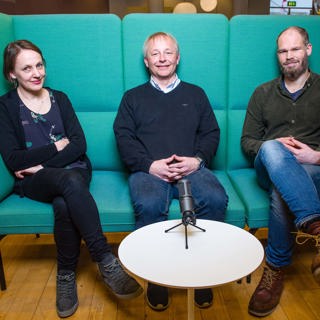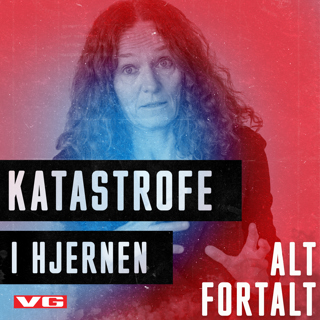
203. Lee McIntyre — How to Talk to a Science Denier: Conversations with Flat Earthers, Climate Deniers, and Others Who Defy Reason
"Climate change is a hoax — and so is coronavirus." "Vaccines are bad for you." These days, many of our fellow citizens reject scientific expertise and prefer ideology to facts. They are not merely uninformed — they are misinformed. They cite cherry-picked evidence, rely on fake experts, and believe conspiracy theories. How can we convince such people otherwise? How can we get them to change their minds and accept the facts when they don't believe in facts? In this conversation based on his new book, Lee McIntyre shows that anyone can fight back against science deniers, and argues that it's important to do so.
24 Aug 20211h 35min

202. Julia Galef — The Scout Mindset: Why Some People See Things Clearly and Others Don't
When it comes to what we believe, humans see what they want to see. We have what Julia Galef calls a "soldier" mindset: a drive to defend the ideas we most want to believe — and shoot down those we don't. But if we want to get things right more often, argues Galef, we should train ourselves to have a "scout" mindset. Unlike the soldier, a scout's goal isn't to defend one side over the other. It's to go out, survey the territory, and come back with as accurate a map as possible. Regardless of what they hope to be the case, above all, the scout wants to know what's actually true. In The Scout Mindset, Galef explores why our brains deceive us and what we can do to change the way we think.
21 Aug 20211h 46min

201. Michael Shermer on Evolution, I.D. Theory, Consciousness, Morality, Gullibility, and Nothing (AMA # 7)
In this AMA Dr. Michael Shermer answers your questions about evolution and creationism, intelligent design theory, the hard problem of consciousness, the origins of morality, how science deals with anomalies, to what extent humans are naturally rational or irrational / skeptical or gullible, and why there is something rather than nothing.
18 Aug 20211h 13min

200. Philip Zimbardo on the Nature & Nurture of Good & Evil
August 15 marks the 50th anniversary of day one of the Stanford Prison Experiment — one of the most controversial studies in the history of social psychology. In this conversation, Michael Shermer speaks with renowned social psychologist and creator of the Stanford Prison Experiment Philip Zimbardo, exploring the mechanisms that make good people do bad things, how moral people can be seduced into acting immorally, and what this says about the line separating good from evil. His book, The Lucifer Effect, explains why we are all susceptible to the lure of "the dark side." and how situational forces and group dynamics can work in concert to make monsters out of decent men and women. Shermer and Zimbardo discuss: Zimbardo's life mission to understand the nature of evil, the Stanford Prison Experiment (SPE) and its critics, the nature of human nature, The Dark Triad that leads to violence, obedience to authority, free will/determinism, and how we can teach ourselves to act heroically.
15 Aug 20211h 49min

199. David Potter — Disruption: Why Things Change
This conversation takes a deep dive into disruptions. How do things change? The question is critical to the historical study of any era but it is also a profoundly important issue today as western democracies find the fundamental tenets of their implicit social contract facing extreme challenges from forces espousing ideas that once flourished only on the outskirts of society. Not all radical groups are the same, and all the groups that the book explores take advantage of challenges that have already shaken the social order. They take advantage of mistakes that have challenged belief in the competence of existing institutions to be effective. It is the particular combination of an alternative ideological system and a period of community distress that are necessary conditions for radical changes in direction. As Disruption demonstrates, not all radical change follows paths that its original proponents might have predicted.
10 Aug 20211h 23min

198. Bernardo Kastrup on the Nature of Reality: Materialism, Idealism, or Skepticism
In this expansive conversation, Michael Shermer speaks with Bernardo Kastrup, the executive director of Essentia Foundation. His work has been leading the modern renaissance of metaphysical idealism, the notion that reality is essentially mental. He has a Ph.D. in philosophy (ontology, philosophy of mind) and another Ph.D. in computer engineering (reconfigurable computing, artificial intelligence). Shermer and Kastrup discuss: materialism, idealism, dualism, monism, panpsychism, free will, determinism, consciousness, the problem of other minds, artificial intelligence, out of body and near-death experiences, model dependent realism, and the ultimate nature of reality.
7 Aug 20212h 13min

197. Yaron Brook on Ayn Rand, Atlas Shrugged, and Objectivism
Michael Shermer speaks with entrepreneur, writer, and activist Yaron Brook about Ayn Rand, Atlas Shrugged, Objectivism; individualism vs. collectivism; the nature of human nature; altruism, cooperation, reparations, and charity; the starting point of morality and the foundation of ethics; collective action problems and how they are best solved; our moral obligation to help those who cannot help themselves; the Is-Ought problem of determining right and wrong; reason and empiricism; immigration, abortion, foreign wars, the welfare state, and terrorism.
3 Aug 20212h 6min

196. Annie Murphy Paul — The Extended Mind: The Power of Thinking Outside the Brain
In this conversation about her new book, the acclaimed science writer Annie Murphy Paul explodes the myth that the brain is an all-powerful, all-purpose thinking machine that works best in silence and isolation. We are often told that the human brain is an awe-inspiring wonder, but its capacities are remarkably limited and specific. Humanity has achieved its most impressive feats only by thinking outside the brain: by "extending" the brain's power with resources borrowed from the body, other people, and the material world. The Extended Mind tells the stories of scientists and artists, authors and inventors, leaders and entrepreneurs — Jackson Pollock, Charles Darwin, Jonas Salk, Friedrich Nietzsche, Watson and Crick, among others — who have mastered the art of thinking outside the brain. It also explains how every one of us can do the same, tapping the intelligence that exists beyond our heads — in our bodies, our surroundings, and our relationships.
31 Jul 20211h 34min




















